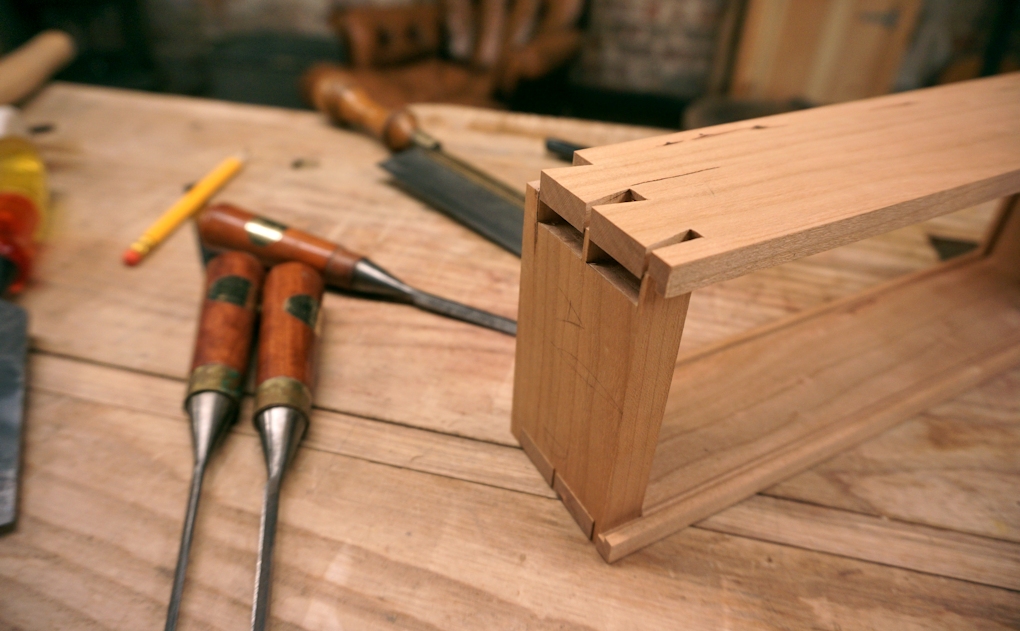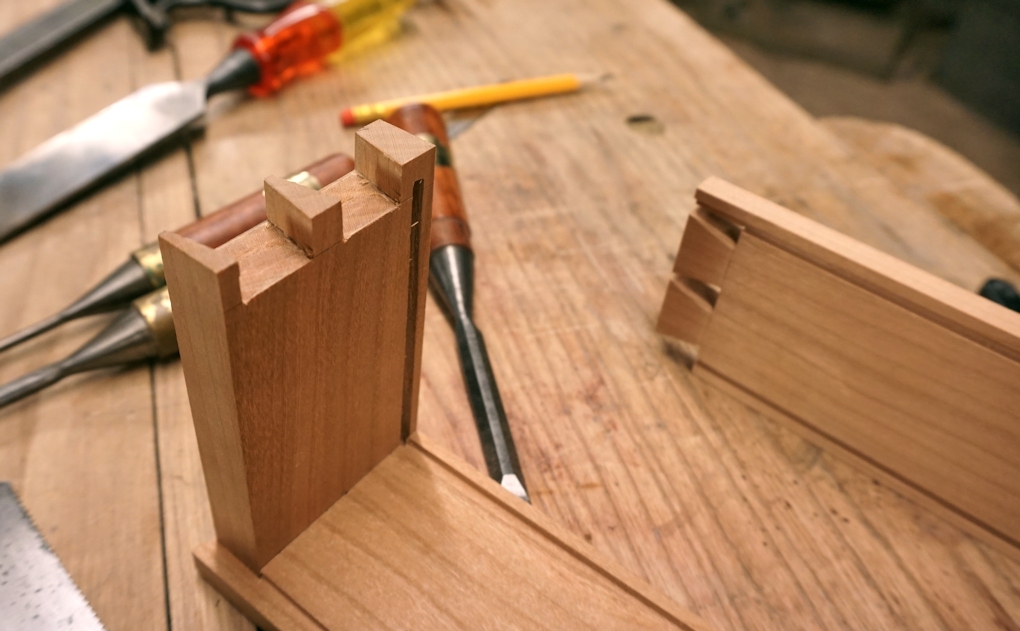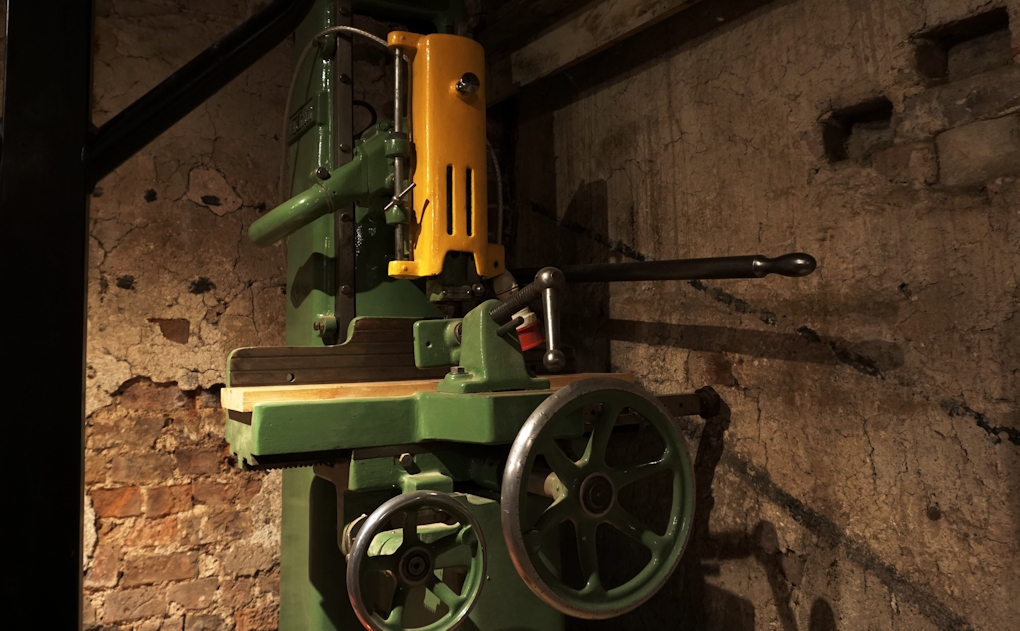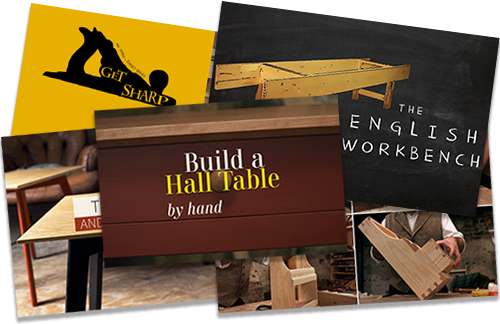 I’ll be the first to say that I’m crap when it comes to small scale box making. I could never make a living at it because it takes me a tremendous amount of time to create something that is much too small to command a decent price and turn a profit.
I’ll be the first to say that I’m crap when it comes to small scale box making. I could never make a living at it because it takes me a tremendous amount of time to create something that is much too small to command a decent price and turn a profit.
That’s the problem with earning from small pieces – it’s difficult to get across to the untrained eye just how much work goes in to a build. Professional box makers always amaze me, they put in just the right touch to ensure that their box ‘feels’ too special to ignore, like a proper little treasure trove.
 Most professional woodworkers and furniture makers will tell you to make sure you get a nice big table on offer to your customers, and I would too. They’re among the simplest furniture items to build and yet carry a good hefty weight when it comes to pricing. By comparison you feel like you have to give away the chairs. People expect you to surround that nice big table with six or eight of them, but the whole set should be made for less than the price of the one table!
Most professional woodworkers and furniture makers will tell you to make sure you get a nice big table on offer to your customers, and I would too. They’re among the simplest furniture items to build and yet carry a good hefty weight when it comes to pricing. By comparison you feel like you have to give away the chairs. People expect you to surround that nice big table with six or eight of them, but the whole set should be made for less than the price of the one table!
 It’s these unwritten rules of value that put you off building certain items altogether, which is why I find it important to make pieces that are not going to be sold as often as I can. Take away that pressure of a price tag, the concern of profit and a deadline, and somehow no money at all can be more rewarding. I’ve been pottering of late making some little boxes, which has helped me to relax and unwind on evenings after the anxious launch of our Premium Video. They’re only out of some off-cuts that would have otherwise been fire wood, and it’s a lovely change of pace.
It’s these unwritten rules of value that put you off building certain items altogether, which is why I find it important to make pieces that are not going to be sold as often as I can. Take away that pressure of a price tag, the concern of profit and a deadline, and somehow no money at all can be more rewarding. I’ve been pottering of late making some little boxes, which has helped me to relax and unwind on evenings after the anxious launch of our Premium Video. They’re only out of some off-cuts that would have otherwise been fire wood, and it’s a lovely change of pace.
I know the most satisfying part will be giving them away as gifts, although I’m not sure my family would agree. I get the feeling that most of them are rolling their eyes as I hand over yet another piece made out of wood, they’d probably just prefer perfume scented after some celeb’s crotch. Still you can never have enough little boxes.






I did the small item thing for a few years when I was selling stuff at craft shows. You’re dead on here as I could never command much in price when the physical item is so small. I then changed my designs so I could mass produce them and therefore have more to sell in a similar amount of time. But I’ll be honest I hated that style of working and I lost all joy in it at that point.
You’re right about boxes Richard; they’re little buggers, but look on the bright side. You can build a hell of a lot into a little box and use a small quantity of fantastically figured timber….but nobody will give you what it’s worth. The other bonus is that box makers don’t usually need a workshop the size of a 747 hanger and can build lovely stuff in a pretty small space.
I always keep one big project on the go (a large eight (!) legged cabinet at the moment) and a smaller one, such as a box of some sort.
“I’ve been pottering of late making some little boxes”
Since I retired (not from woodwork – I had an office job), all I have done is potter about in my garage. It’s wonderful therapy, pottering.
Got a chuckle from this.
We Americans putter, whilst you Brits potter.
A friend of mine used to have an old fiddle hanging in his woodshop so he could “fiddle” around in his shop.
I have a friend who makes custom perfume. I’ll have to ask her if she uses celebrity crotches in her formula.
I’m reminded of my friend who makes a good living making as a cabinet maker and finish carpenter. It’s a challenge to love, enjoy, get energy from, that which you have to do. (The want of money is the root of all sorts of evil?) Sometimes we might just have to potter some boxes from the scrap.
You are so right you can’t make a living making little boxes. I have been making small boxes for many years now. I have sold many and given away more. But it’s hard to sell a box for $100 that you have $150 or more into. It is not a profitable thing and you are lucky if you can sell it for the 100 bucks. I’m a retired man so I don’t have to make a living making boxes. It is rewarding to sell a few now and then however. Making a few buck pays for the (I just have to have one of those stuff) so I guess I’ll keep on doing it.
.
Sorry — I must disagree here. In woodworking, if you create a niche product, you’ll sell regardless of size. Successful woodturners or spoon makers can tell you how they can raise a family with small stuff.
American box-maker Doug Stowe is one of the better-known example. A friend of mine makes furniture — large pieces — and he needs a day-time job to survive. Size doesn’t matter; skills — including business and marketing skills — are more important than the size of a project.
Thing is, I can turn a perfectly acceptable lidded box in no more than 40 mins these days, lathe work is somewhat faster.
By day-time job, I mean a non-woodworking day-time job.
Perhaps you should include a bottle of crotch perfume inside the little box.
Maybe off topic, but how did you do the stopped groove on that pin board? It’s something I’m currently struggling with.
Looks router table-ish to me. I see a round end.
I’m guessing he used a router plane, or a plow without a skate? Grasping at straws, but the router plane with a fence is pretty much a plow without a skate, really…
My exact question here. I’ve been looking for a hand tool method for this for a long time!
Hope this thread isn’t completely dead!
Doug Stowe also teaches, writes books, sells DVDs and makes furniture
You are right that getting no money at all can be more rewarding. Some things are just too precious to rush for money.
I turn offcuts into little wooden Duckies to give away. Flat pieces become panels for Byzantine icons…
I like that “celebs crotch”
Hi Richard, have a look at Philip Weber’s wonderful miniature creations. It’s just finding what works for you. I would stick to cedar of lebanon, the smell will last longer and probably be more pleasant!
“It’s just finding what works for you.”
Yeah, that’s a part of it, too. If you don’t have a vested interest in what you’re doing, then it will show, maybe not right away, but eventually. The best way to keep that aspect of your work intact is, as David points out more succinctly than I will ever manage, doing something that you enjoy doing.
Agreed. I had a commission for a box priced at $400 and I live in a poor province in Canada. No matter what you build big or small has to mean something to your clients and has to be built from your heart.
Being successful at woodworking (any form of woodworking, but especially one who makes boxes) involves more than just being an accomplished woodworker. You also have to be good in business practices. That means maintaining a tool chest of necessity, not a tool chest of wanton random tool purchases. That means being able to keep track of income and expenses and follow a budget (in your personal life as well as your professional life). That means knowing how to price your work – not too high, but also not too low!
You also have to be able to market your product in some capacity that is more than just opening up an Etsy shop, hoping people find it and decide to drop $400 on a box.
But it’s more than THAT, even. You have to have a product that is WORTH $400-$500. You can’t just grab the next board of walnut off your lumber rack, cut it to dimensions, glue it up, spray it with a shake-can of lacquer, and call it done.
You have to start with proper design, then select the proper wood, then build with quality construction techniques. Your hardware needs to reflect quality, as well – extruded brass hinges instead of pressed ones from the big box store and quality locks that will last 200 years. Then you have to have good finishing techniques – a finish that fits the product, no drips or runs, that sort of thing. And you have to be able to do all of that in a timely manner!
Somewhat along with the design aspect is you have to have something unique (or at least more unique than the next guy), something catchy or quirky, something that really draws the customer in and makes them INTERESTED in what you have to sell. But it can’t be a gimmick; people will see through that very quickly!
You have to have something, though, because I think selling a box is FUNDAMENTALLY DIFFERENT than selling a table or dresser. People buy tables and dressers because, at the very least, they need tables and dressers. People buy boxes because the box says something to them, makes them WANT to own it, to put it on their dresser and use it to store their cherished items. It’s a completely different mind set. If you try to build boxes like you build tables, you won’t have a successful business.
And I also think the kind of person who is going to drop $500 on a box is generally the kind of person who can see through the BS. You can’t say you make artistic boxes and then sell a bunch of boxes that, honestly, look pretty much exactly the same and are boring, to boot. That isn’t artistic, no matter how many times you say it. And it isn’t something people are going to want to spend their hard-earned money on. They have to truly be artistic in some manner.
I’m fortunate in that I really enjoy my day job AND I get to occasionally make boxes on commission for people. I don’t cheap out – I use Brusso hinges and locks imported from England. I’m usually $100 into a box in just hardware and lumber before I even make the first cut. My prices reflect that and the client understands it up-front. And when I’m done with a box, I send it to the buyer to examine. If they don’t want it, they can send it back and not pay me a thing. If they love it, then they pay me for it. (I’ve never had a box returned and two times I’ve had clients pay me MORE than the agreed upon price.)
(That last bit is probably not a good business practice; one of the benefits of being a hobbiest woodworker is that I don’t have to always follow good business practices.)
Obviously, a lot of the above can be expounded upon in great detail; but since this is a comment on a blog post and not a book, I’ll leave it at that. 🙂
Cheers,
TKW
That was a book, wasn’t it?
Yes, I’m sure it was.
I can’t wait for the film.
Ha!
Never claimed to be the succinct woodworker. 😉 I think I’ve neglected my blog a bit too much lately. Need to channel the output a little better.
You are right on the money, Kilt, but while you emphasized the business aspect of making boxes, I think the emphasis should be on their design. You can control every penny spent and every second worked, but if the thing looks like shite, you will never get your investment back, let alone a return on it.
How many times has an amateur woodworker presented the world with his/her “pièce de résistance”; a reasonably well assembled box made with 3/4″ stock taken from a local box store shelf?
Ah, I wasn’t trying to emphasize one over the other; I guess I just got too chatty about the one.
I think there are four key areas you need to recognize and take into consideration in order to be a successful woodworker (in any of the specialties):
– design
– wood selection
– construction
– finish
And I think they are all equally important.
Construction would fall well below the other three, I think. Design and wood selection is way out in front. Most customers don’t care about how you made your joints, or won’t ever even see them, exposed dovetails being an exception.
That said, I only use traditional joints, through tenons, blind dovetails, etc. I do want longevity for my pieces, but that is not what sells them.
TKW
I agree with you on this one ,,, i don’t care what a person makes to sell if the reason is money alone it will show in the work ,,, If you want to make money become a plumber they get paid very well getting rid of crap,,, Cheers Howard
Oddly I find it relaxing to make boxes from pallet wood for no other reason than putting stuff into. That perfume would make an excellent dog present.